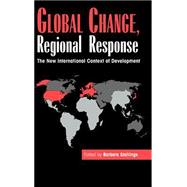
Note: Supplemental materials are not guaranteed with Rental or Used book purchases.
Purchase Benefits
Looking to rent a book? Rent Global Change, Regional Response: The New International Context of Development [ISBN: 9780521472272] for the semester, quarter, and short term or search our site for other textbooks by Edited by Barbara Stallings. Renting a textbook can save you up to 90% from the cost of buying.
| List of tables | |
| List of figures | |
| Acknowledgements | |
| 1. Introduction: global change, regional response Barbara Stallings | |
| Part I. Global Changes: 2. The Third World and the end of the Cold War Fred Halliday | |
| 3. Capitalisms in conflict? The United States, Europe, and Japan in the post-Cold War world Barbara Stallings and Wolfgang Streeck | |
| 4. Global production systems and Third World development Gary Gereffi | |
| 5. New global financial trends: implications for development Stephany Griffith-Jones and Barbara Stallings | |
| 6. The 'triumph' of liberal economic ideas in the developing world Thomas J. Biersteker | |
| Part II. Regional Responses: 7. The East Asian NICs: a state-led path to the developed world Yun-han Chu | |
| 8. Southeast Asia: success through international openness Linda Y. C. Lim | |
| 9. Latin America: toward a new reliance on the market Augusto Varas | |
| 10. Sub-Saharan Africa: underdevelopment's last stand Michael Chege | |
| Part III. Conclusions: 11. The new international context of development Barbara Stallings. |
The New copy of this book will include any supplemental materials advertised. Please check the title of the book to determine if it should include any access cards, study guides, lab manuals, CDs, etc.
The Used, Rental and eBook copies of this book are not guaranteed to include any supplemental materials. Typically, only the book itself is included. This is true even if the title states it includes any access cards, study guides, lab manuals, CDs, etc.